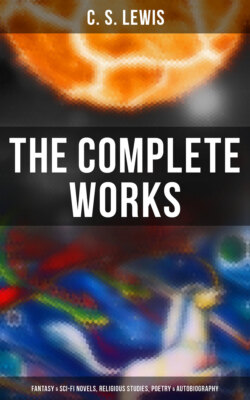Читать книгу The Complete Works: Fantasy & Sci-Fi Novels, Religious Studies, Poetry & Autobiography - C. S. Lewis - Страница 140
На сайте Литреса книга снята с продажи.
VI
ОглавлениеFrost had left the dining-room a few minutes after Wither. He did not know where he was going or what he was about to do. For many years he had theoretically believed that all which appears in the mind as motive or intention is merely a by-product of what the body is doing. But for the last year or so—since he had been initiated—he had begun to taste as fact what he had long held as theory. Increasingly, his actions had been without motive. He did this and that, he said thus and thus, and did not know why. His mind was a mere spectator. He could not understand why that spectator should exist at all. He resented its existence, even while assuring himself that resentment also was merely a chemical phenomenon. The nearest thing to a human passion which still existed in him was a sort of cold fury against all who believed in the mind. There was no tolerating such an illusion! There were not, and must not be, such things as men. But never, until this evening, had he been quite so vividly aware that the body and its movements were the only reality, that the self which seemed to watch the body leaving the dining-room and setting out for the chamber of the Head, was a nonentity. How infuriating that the body should have power thus to project a phantom self!
Thus the Frost whose existence Frost denied watched his body go into the ante-room, watched it pull up sharply at the sight of a naked and bloodied corpse. The chemical reaction called shock, occurred. Frost stooped, turned the body over, and recognised Straik. A moment later his flashing pince-nez and pointed beard looked into the room of the Head itself. He hardly noticed that Wither and Filostrato lay there dead. His attention was fixed by something more serious. The bracket where the Head ought to have been was empty: the metal ring twisted, the rubber tubes tangled and broken. Then he noticed a head on the floor: stooped and examined it. It was Filostrato’s. Of Alcasan’s head he found no trace, unless some mess of broken bones beside Filostrato’s were it.
Still not asking what he would do, or why, Frost went to the garage. The whole place was silent and empty; the snow was thick on the ground by this. He came up with as many petrol tins as he could carry. He piled all the inflammables he could think of together in the Objective Room. Then he locked himself in by locking the outer door of the ante-room. Whatever it was that dictated his actions then compelled him to push the key into the speaking-tube which communicated with the passage. When he had pushed it as far in as his fingers could reach, he took a pencil from his pocket and pushed with that. Presently he heard the clink of the key falling on the passage floor outside. That tiresome illusion, his consciousness, was screaming in protest: his body, even had he wished, had no power to attend to those screams. Like the clockwork figure he had chosen to be, his stiff body, now terribly cold, walked back into the Objective Room, poured out the petrol and threw a lighted match into the pile. Not till then did his controllers allow him to suspect that death itself might not after all cure the illusion of being a soul—nay, might prove the entry into a world where that illusion raged infinite and unchecked. Escape for the soul, if not for the body, was offered him. He became able to know (and simultaneously refused the knowledge) that he had been wrong from the beginning, that souls and personal responsibility existed. He half saw: he wholly hated. The physical torture of the burning was hardly fiercer than his hatred of that. With one supreme effort he flung himself back into his illusion. In that attitude eternity overtook him as sunrise in old tales overtakes trolls and turns them into unchangeable stone.
